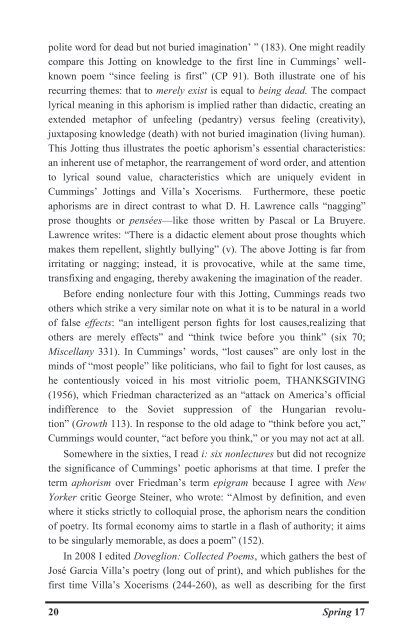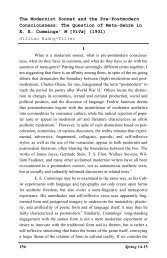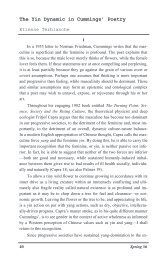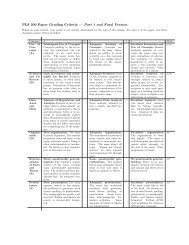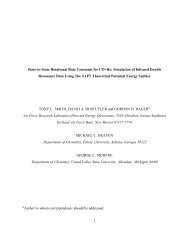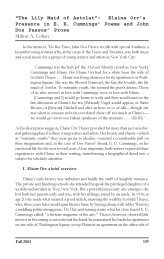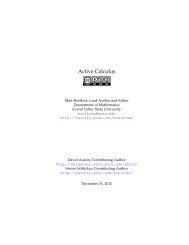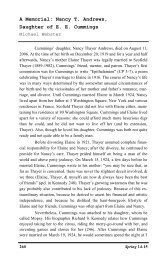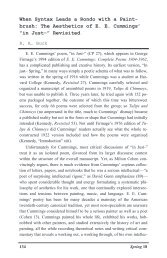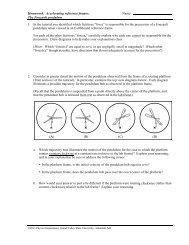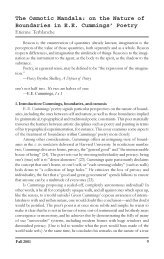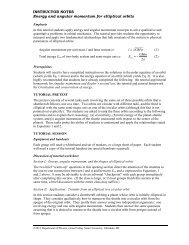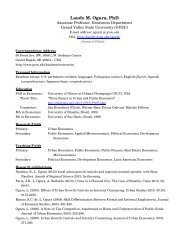E.E. Cummings' 'Jottings' and José Garcia Villa's 'Xocerisms ... - Gvsu
E.E. Cummings' 'Jottings' and José Garcia Villa's 'Xocerisms ... - Gvsu
E.E. Cummings' 'Jottings' and José Garcia Villa's 'Xocerisms ... - Gvsu
Create successful ePaper yourself
Turn your PDF publications into a flip-book with our unique Google optimized e-Paper software.
polite word for dead but not buried imagination’ ” (183). One might readilycompare this Jotting on knowledge to the first line in Cummings’ wellknownpoem “since feeling is first” (CP 91). Both illustrate one of hisrecurring themes: that to merely exist is equal to being dead. The compactlyrical meaning in this aphorism is implied rather than didactic, creating anextended metaphor of unfeeling (pedantry) versus feeling (creativity),juxtaposing knowledge (death) with not buried imagination (living human).This Jotting thus illustrates the poetic aphorism’s essential characteristics:an inherent use of metaphor, the rearrangement of word order, <strong>and</strong> attentionto lyrical sound value, characteristics which are uniquely evident inCummings’ Jottings <strong>and</strong> Villa’s Xocerisms. Furthermore, these poeticaphorisms are in direct contrast to what D. H. Lawrence calls “nagging”prose thoughts or pensées—like those written by Pascal or La Bruyere.Lawrence writes: “There is a didactic element about prose thoughts whichmakes them repellent, slightly bullying” (v). The above Jotting is far fromirritating or nagging; instead, it is provocative, while at the same time,transfixing <strong>and</strong> engaging, thereby awakening the imagination of the reader.Before ending nonlecture four with this Jotting, Cummings reads twoothers which strike a very similar note on what it is to be natural in a worldof false effects: “an intelligent person fights for lost causes,realizing thatothers are merely effects” <strong>and</strong> “think twice before you think” (six 70;Miscellany 331). In Cummings’ words, “lost causes” are only lost in theminds of “most people” like politicians, who fail to fight for lost causes, ashe contentiously voiced in his most vitriolic poem, THANKSGIVING(1956), which Friedman characterized as an “attack on America’s officialindifference to the Soviet suppression of the Hungarian revolution”(Growth 113). In response to the old adage to “think before you act,”Cummings would counter, “act before you think,” or you may not act at all.Somewhere in the sixties, I read i: six nonlectures but did not recognizethe significance of Cummings’ poetic aphorisms at that time. I prefer theterm aphorism over Friedman’s term epigram because I agree with NewYorker critic George Steiner, who wrote: “Almost by definition, <strong>and</strong> evenwhere it sticks strictly to colloquial prose, the aphorism nears the conditionof poetry. Its formal economy aims to startle in a flash of authority; it aimsto be singularly memorable, as does a poem” (152).In 2008 I edited Doveglion: Collected Poems, which gathers the best ofJosé <strong>Garcia</strong> Villa’s poetry (long out of print), <strong>and</strong> which publishes for thefirst time Villa’s Xocerisms (244-260), as well as describing for the first20 Spring 17


